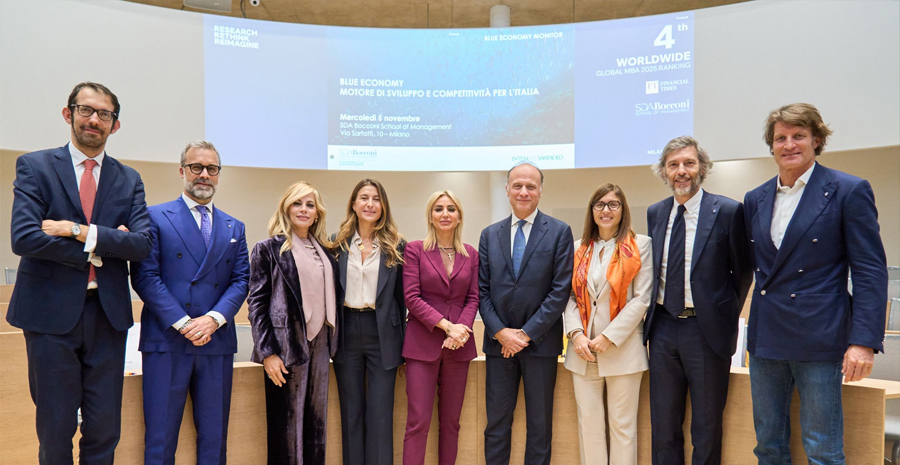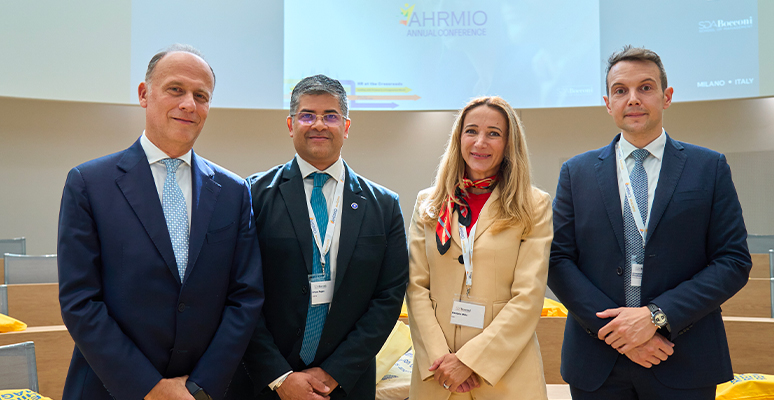
- Start date
- Duration
- Format
- Language
- 10 mar 2026
- 40 hours
- Online
- Italian
Il corso intende fornire tutte le competenze necessarie a padroneggiare e applicare i principali strumenti e framework esistenti in materia di sustainability reporting.
More than 50% of global GDP is exposed to risks linked to nature degradation. Regenerating nature, therefore, also means regenerating the economy, and businesses can play a key role in this effort.
Sylvie Goulard, Professor of Practice in Global Affairs (sustainability, green finance, and geopolitics), has just published the report Regenerating nature means regenerating the economy, a collaboration between SDA Bocconi School of Management and 2050Now, a French initiative that aims to support people and companies in the ecological transition by providing information, solutions, and tools to act for the climate and biodiversity.
The report was presented on November 18 in Paris before an audience of 400 students from various grandes écoles and discussed with Hélène Valade, LVMH Group Environment Development Director, and Laurence Pessez, BNP Paribas Global Chief Sustainability Officer.
The conservation of nature is an economic challenge that a growing number of companies are beginning to face. The pioneers — particularly the firms gathered around 2050Now — are experimenting with business in nature: as natural resources become increasingly scarce and climate crises more frequent, companies have every interest in protecting their value chains, reducing financial risks, and ensuring continuity. At the same time, they can be part of the solution — for instance, through remediation activities, water treatment, or low-emission transport.
The report calls for moving beyond the climate dimension alone, focusing on so-called nature-based solutions. In a context where extreme weather events are set to multiply, it is necessary to rediscover the irreplaceable role of nature as a carbon sink and as a barrier against erosion. The research specifically explores the potential of regenerative agriculture and the challenges linked to soil, water, and oceans.
Today, many organizations still perceive nature as a matter of corporate social responsibility. In reality, it forms the very foundation of all economic activity. It is estimated that 58 trillion dollars of global economic value — more than half of the world’s GDP — are directly exposed to risks associated with environmental degradation.
The top four risks identified by the World Economic Forum for the next decade are all connected to nature: extreme weather events, biodiversity loss, critical changes in Earth systems, and resource scarcity. The negative externalities of some sectors on the ecosystem — that is, unaccounted costs — are estimated at between 10 and 25 trillion dollars a year (IPBES Nexus report).
Several major companies affiliated with 2050Now are already moving in this direction. LVMH promotes regenerative agriculture practices in its strategic supply chains; ENGIE and Veolia are developing solutions for purification, water treatment, and the reduction of fossil energy use; SNCF Voyageurs is adopting energy-efficiency strategies and plans to cut water consumption. As Thomas Buberl, CEO of AXA, has reminded, “A company that does not have an ecological adaptation plan will soon no longer be insurable.” Without adaptation, there is no insurability — and without insurability, there is no economic activity.
However, the success of this transition requires broad mobilization: rigorous measurement of dependencies and impacts, but also the involvement of local communities and Indigenous peoples, the first stewards of nature. Within companies, managers, employees, and clients must all feel part of the change. Public authorities, for their part, need citizens’ support and the independent contribution of the scientific community to counter misinformation.
The report also emphasizes the importance of four key elements: the engagement of people and territories; the fight against misinformation; the use of positive psychological levers to drive action (as demonstrated by neuroscience); and the role of companies as places of learning, participation, and collective alignment.
At a time when the fight against climate change seems to be losing prominence, it is essential to understand that resilience is a holistic concept. Ignoring the destruction of the living world means making our economies and societies more vulnerable.
Regenerating nature means building a sustainable economy — one based on responsible enterprises, a more resilient society, and a form of prosperity that does not consume life itself. Nature is humanity’s most precious capital — and humanity must remember that it is an integral part of it.
SDA Bocconi School of Management

Il corso intende fornire tutte le competenze necessarie a padroneggiare e applicare i principali strumenti e framework esistenti in materia di sustainability reporting.

Acquisire competenze su normative, compliance e responsabilità aziendali per prevenire contenziosi e gestire le implicazioni legali dei fattori ESG in impresa.

Il programma ha l’obiettivo di supportare le imprese in una transizione che porti ad allineare gli obiettivi professionali con quelli della società civile

